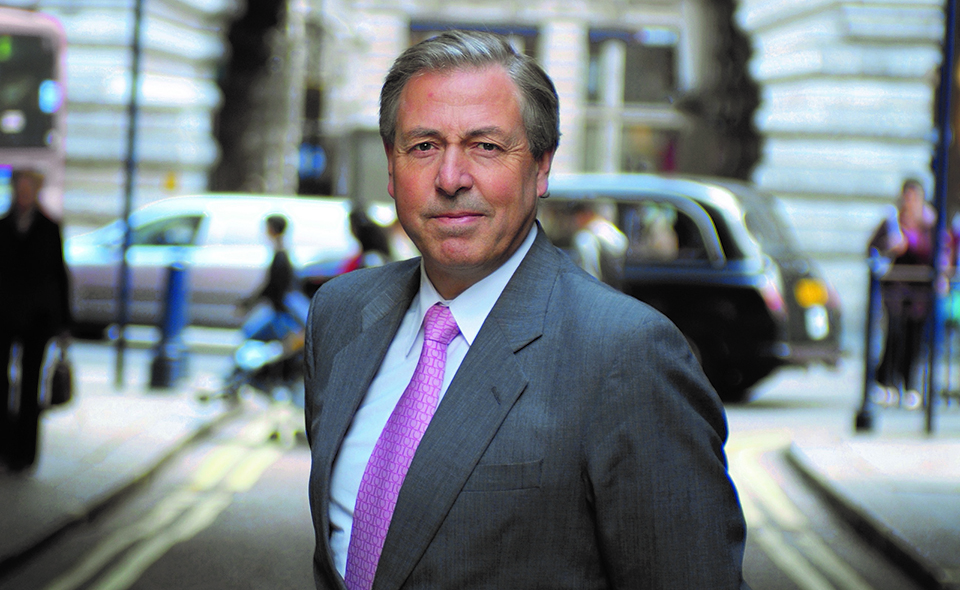As a chartered surveyor, arbitrator, valuer and expert witness, Graham has amassed a wealth of experience in the UK property sector over decades of successful practice. In this feature, he shares his insights as to where the property sector is heading and how he has found success in his professional pursuits.
For our readers who may not know of you, please tell us a little about your career development to date.
I am a chartered surveyor and chartered arbitrator. My first job was as a building surveyor at the BBC in 1976, followed by a spell from 1978 at Ladbrokes as a regional estate manager, joining Clive Lewis and Partners Commercial Property Agents and Consultants on 1 January 1980. I was appointed an equity partner in 1985, heading up the retail division before merging with Edward Erdman to form Colliers Erdman Lewis in 1993, where I was chairman of the retail group. I left in 1994 and set up Chase and Partners, which commenced trading on 1 June 1995. 27 years of progress has seen the company change and evolve with the ebb and flow of market conditions, employing over 50 people by 2005 but now much smaller and operating with a wide range of consultants brought in to work on specific projects which requires their expertise.
As well as chartered surveyors, Chase & Partners are chartered town planners and I have practiced as a chartered arbitrator in alternative dispute resolution for over 20 years as a member of both the RICS and CIArb dispute resolution panels. I have been a lecturer at Westminster University for over 30 years and about 10 years ago was appointed as a visiting professor. I have held several other posts at a number of universities and have always felt this relationship with education has helped me in my day job as a market-based estate agent and dispute resolver. If you are going to teach others, you must know the subject yourself – an exceptionally good discipline.
What first prompted you to train as a chartered surveyor?
I won an RAF Flying Scholarship and was encouraged to go to Cranwell and train as an RAF pilot but applied instead for a scholarship with BOAC. At the same time, an airline company called Court Line went into receivership, releasing some 200 pilots onto the market who were taken up by BOAC, cancelling all their student pilot training. My father suggested I look at surveying as he knew I got on with people and liked activity, not being stuck behind a desk. It was the best move I made as I have had an enjoyable, interesting, and exciting career which has constantly changed. When I gave up flying as a private pilot in my mid-30s, I realised I would have been bored flying a bus around the skies.
If you are going to teach others, you must know the subject yourself – an exceptionally good discipline.
In the course of your work you have overseen the management and development of retail, food, leisure and healthcare properties. What unique considerations had to be made when handling these distinct sectors?
Although distinct sectors, they have two things in common – property and people. It is always the people who make the business that is conducted from the property work, and it is the people in the property industry that make things happen.
The key is to understand that markets will dominate, and that nobody is bigger than a market. You can become involved, influence and be active in taking advantage of market shifts and trends, but you cannot beat markets – as many major companies and governments have found to their cost. It is therefore critical to be immersed in markets and understand who the players are, what they require, how they operate and where value is secured from their activities. If you understand these fundamentals and work hard at staying connected and ahead of the mass markets, you will succeed. Arrogance, laziness and a lack of understanding of what is happening all around you will cause you to fail.
A common mistake is an expectation that you can predict the future – nobody can. The trick is to understand the history, background and trends, gauge where economies are and feel comfortable making decisions based on informed understanding. However, if you believe you can predict the future, that will be the start of your problems. I believe in a degree of luck, but you tend to make your own luck.
What other insights have you gained from this work?
The importance of friends, integrity and the good people you work with. Whether you are a client or an adviser, it is the combination of the individuals that creates the team, and good teams are successful and a pleasure to work with. Many people say they will not work with friends, but I only ever work with people I am able to refer to as friends.
What changes have you observed in the real estate sector during your time as a surveyor?
Too many to remember, let alone comment on.
What has been the constant are people and their expertise. The good operators can adapt regardless of the circumstances and have a steely determination which is focused but brings everyone into their sphere of influence and confidence. The biggest changes in my career have been government intervention in markets often suffering from the laws of unexpected consequences, the focus on property for government policy and greater taxation, and the spread of technology – such as the development of communication technology from the fax machine to today’s smartphones and computer-based working, and data-based companies who take information from the market and then sell the same information back to the market.
I believe in a degree of luck, but you tend to make your own luck.
On the positive side, I have seen improvements in Industry training, qualification standards and CPD/LLL, but the negatives are loss of wider thought and language precision, siloing of individuals within corporates, a reduction in direct business and social contact with the associated loss of camaraderie and understanding, and the dilution of reliable market journals and accurate reporting standards.
Do you have any predictions for trends that may soon emerge?
Nothing that has not been considered by many, but the key guesses I have about the future from a property perspective are as follows:
General
It will become a more frightening world to operate within as trading blocs become more politically motivated, with the potential for greater conflict arising such as the current war in Ukraine and the tension between China and Taiwan. We may see the emergence of a new cold war era as energy and water will become resources that economic blocs will fight over. The elderly will be forced to work beyond the increased retirement age because of rising costs of day-to-day living, medical needs and care, and the individual will become subject to closer daily scrutiny.
Electronic formats will become dominant but lead to a number of social classes being excluded. Many of the poor standard apartment blocks that have been built since the 1990s will become the slums of today as property development and the creation of modern property-based factors of production will become increasingly nationalised by quota and taxation provisions. Those town centres that do not create mixed uses and communities where people live, work and play and which are run with the provision of local services such as education, medical and police run the risk of becoming backwaters. I fear the current government sustainability programme for existing buildings may result in a swathe of redundant property creating a significant underutilisation of existing stock as a factor of production with the consequent economic impact and greater damage to the environment – not less.
Business
Start-up businesses by private individuals will be difficult to finance and maintain. Those that can grow will be increasingly burdened by administrative and statutory requirements, snuffing out entrepreneurial thoughts and activities. The winning businesses will be those that get their teams to work together regularly and not sat in front of a screen at home in isolation, bringing teamwork to the fore and allowing new and inexperienced staff to be trained by the involvement and availability of experienced staff on site. Workers will have to learn to live closer to where they work, meaning that retailers will win physical trading where they focus on centres that have a local population or on larger centres where the environment is an exciting and dynamic one.
The winning businesses will be those that get their teams to work together regularly and not sat in front of a screen at home in isolation
Investment
There is a lack of understanding of how property markets work, which will result in more failures in many aspects of the property market both residential and commercial. The legal issues arising are becoming more complex, more expensive to deal with and less capable of providing what is required by both occupiers and owners. The mismatch between short-term occupation requirements by businesses and long-term capital requirements of developers and investors will make property more expensive to produce and property investment returns increasingly difficult to secure.
Winning locations will be focused around or close to strong transport hubs, with property winners being those who can provide a quality product and avoid short-term profiles. Winning property investors will be those who understand tenants as customers and provide a service that supports the occupying business but does not interfere with their ability to operate independently. There are some great experienced property investors and managers who can provide such facilities, but there are many who provide poor, depressing spaces that will drive more individuals to work from home.
In addition to your role as a surveyor, you are also a practiced arbitrator and expert witness. Based on your experiences, can you offer any advice to new practitioners in these areas?
Every case is different, but my experiences are as follows:
Dispute Resolution (Arbitration and Independent Expert)
Cases can be complex. It is important to read everything that is put to you and ensure both sides have a fair chance of putting their arguments forward. The art is determining what the issues are, understanding the arguments and making your decision on each one straightforward and understandable. In most cases, even when a party has lost, they accept the decision if they can see why they have lost. It is when reasons are fudged or poor that the parties to a dispute become frustrated and disappointed with the service.
So: keep matters as simple as possible; do not enter the arena; remain independent and have empathy with those involved – they all have a difficult job to do. Remember it is always the parties’ dispute and not yours as the dispute resolver; you are providing a service. Respond quickly, but ensure you think carefully before putting things down in writing.
When preparing your decision, keep walking away from it and coming back and let your final draft settle for a few days before going over it again, as you will change a number of points of detail. The decision must flow, and the eventual answer must be a natural consequence of what you say. If the final decision is a shock which does not match up with reasoning, the decision is probably wrong.
Expert Witness
Make sure that you have assessed the case and your professional opinion supports your client’s case. If not, you must not accept the instruction. Be well prepared and ensure what you say is backed up by the evidence. Understand your independence from the client and your duty to the court or tribunal. Being an expert witness is all-consuming, mentally draining and extremely challenging work. Do not take it on unless you are prepared to commit fully to the process and pressure.
Make sure that you have assessed the case and your professional opinion supports your client’s case. If not, you must not accept the instruction.
How do you measure your success?
There is no single measure to success, but the following tend to be the benchmarks I apply:
- Sense of personal achievement;
- Satisfaction of the team and client on the completion of an instruction that achieves its objectives as set;
- The company secures its future for another year
- Staff receive good commissions and bonuses in addition to their salary;
- Surplus payments are available to pay Members;
- Recognition by the market that we have a role to play.
Of your many career accomplishments, is there one which you are most proud of having achieved?
There are a number which I cannot separate, but the following are foremost in my mind:
- The success of Chase & Partners continuing to have a viable and exciting business after 27 years of trading;
- My appointment as a visiting professor to Westminster University with 35 years of lecturing as a market-based contributor;
- Becoming President of the Royal Institution of Chartered Surveyors;
- Becoming Master of the Worshipful Company of Chartered Surveyors;
- Becoming Chairman of the Saracens Multi-Academy Trust;
- Having a wonderful and happy family despite all my external commitments.
How does the work you are undertaking today draw upon the skills and experiences you have developed to date?
As a property adviser to a number of long-standing clients, it is the breadth and detail of many years of trading and working at the coal face of the market that provides me with the advantage of imparting that knowledge and expertise to my client base – in particular, how to approach a negotiation and the basis on which the negotiation is undertaken benefits from many years of learning, often the hard way.
Always remember the lessons you have learnt and do not let an unpleasant experience repeat itself. There is much that can be taken and applied from history.
The ability to apply particular circumstances to an instruction with a good knowledge of the wider market is key. Too many professionals have been siloed and have limited wider experiences. Despite their expertise in a single subject, they are often unable to apply it to a wider understanding of where their position sits and the overall strategy of what is required. My wider knowledge has always given me an advantage when applying my expertise and knowledge to a subject.
My recent appointment as one of the three panel arbitrators chaired by Lord Neuberger on the MOD Estate is a good example of where a wider perspective is required to determine how an answer can be assessed, prepared and determined, yet the ability to work on the detail was equally as important.
[ymal]
Can you share anything about your plans for the remainder of 2022 and beyond?
I wish to look at passing on the business to another party who can develop what I have achieved to date and grow its potential at the same time being flexible enough to follow the ebb and flow io the property marketplace.
In that respect, I am not ready to retire but want time to focus on my skills and expertise as a chartered surveyor and chartered arbitrator without the complications of having to run the business on a day-to-day basis. Over the past 40 years I have run large departments in leading surveying companies, floated companies on the stock market and run my own business and feel that this type of activity needs fresh eyes and a new enthusiasm to take Chase & Partners to the next level. I am looking forward to being part of that journey for a few more years, following someone else who has the drive and determination to make an idea work with passion.
Professor Graham F Chase, Chairman (FRICS FCIArb C.Arb FRSA FInstCPD(Hon))
6 Maiden Lane, Covent Garden, London WC23 7NW
Tel: +44 02074 621340 | +44 02074 621353
Mob: +44 07971 687638
Graham Chase is a chartered surveyor, arbitrator and RICS registered valuer with a career of achievements in the property sector. As outlined in this interview, he has multiple decades’ worth of experience in his practice and is a trained arbitrator and independent expert witness in alternative dispute resolution, having worked on tribunals for almost 40 years. He has delivered many awards and determinations on a wide range of property disputes and recently was appointed as one of the three panel arbitrators, chaired by Lord Neuberger, on a significant Ministry of Defence rent review dispute. He has also been awarded UK Commercial Property Company Chairman of the Year 2021 and UK Commercial Property Business Leader of the Year 2022 by CEO Monthly.
Chase & Partners is a London-based firm that specialises in all aspects of commercial property. As RICS-compliant and registered valuers with over 100 years’ worth of experience in commercial property activity across the UK, the firm’s staff are market leaders in multiple specialist property disciplines and offer expert advice to retailers, businesses, institutions, government and statutory bodies, local authorities, independents and private individuals.





















